The reason Quantum Theory can allow the energy density to be negative, is that it is based on the Uncertainty Principle.
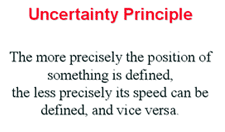
This says that certain quantities, like the position and speed of a particle, can't both have well defined values. The more accurately the position of a particle is defined, the greater is the uncertainty in its speed, and vice versa. The uncertainty principle also applies to fields, like the electro-magnetic field, or the gravitational field. It implies that these fields can't be exactly zeroed, even in what we think of as empty space. For if they were exactly zero, their values would have both a well-defined position at zero, and a well-defined speed, which was also zero. This would be a violation of the uncertainty principle. Instead, the fields would have to have a certain minimum amount of fluctuations. One can interpret these so called vacuum fluctuations, as pairs of particles and anti particles, that suddenly appear together, move apart, and then come back together again, and annihilate each other.
 These particle anti particle pairs, are said to be virtual, because one
can not measure them directly with a particle detector. However, one
can observe their effects indirectly. One way of doing this, is by what
is called the Casimir effect. One has two parallel metal plates, a
short distance apart. The plates act like mirrors for the virtual
particles and anti particles. This means that the region between the
plates, is a bit like an organ pipe, and will only admit light waves of
certain resonant frequencies. The result is that there are slightly
fewer vacuum fluctuations, or virtual particles, between the plates,
than outside them, where vacuum fluctuations can have any wavelength.
The reduction in the number of virtual particles between the plates
means that they don't hit the plates so often, and thus don't exert as
much pressure on the plates, as the virtual particles outside. There is
thus a slight force pushing the plates together. This force has been
measured experimentally. So virtual particles actually exist, and
produce real effects.
These particle anti particle pairs, are said to be virtual, because one
can not measure them directly with a particle detector. However, one
can observe their effects indirectly. One way of doing this, is by what
is called the Casimir effect. One has two parallel metal plates, a
short distance apart. The plates act like mirrors for the virtual
particles and anti particles. This means that the region between the
plates, is a bit like an organ pipe, and will only admit light waves of
certain resonant frequencies. The result is that there are slightly
fewer vacuum fluctuations, or virtual particles, between the plates,
than outside them, where vacuum fluctuations can have any wavelength.
The reduction in the number of virtual particles between the plates
means that they don't hit the plates so often, and thus don't exert as
much pressure on the plates, as the virtual particles outside. There is
thus a slight force pushing the plates together. This force has been
measured experimentally. So virtual particles actually exist, and
produce real effects.Because there are fewer virtual particles, or vacuum fluctuations, between the plates, they have a lower energy density, than in the region outside. But the energy density of empty space far away from the plates, must be zero. Otherwise it would warp space-time, and the universe wouldn't be nearly flat. So the energy density in the region between the plates, must be negative.
We thus have experimental evidence from the bending of light, that space-time is curved, and confirmation from the Casimir effect, that we can warp it in the negative direction. So it might seem possible, that as we advance in science and technology, we might be able to construct a wormhole, or warp space and time in some other way, so as to be able to travel into our past. If this were the case, it would raise a whole host of questions and problems. One of these is, if sometime in the future, we learn to travel in time, why hasn't someone come back from the future, to tell us how to do it.
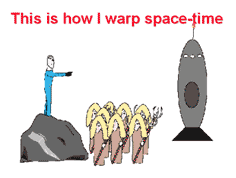 Even
if there were sound reasons for keeping us in ignorance, human nature
being what it is, it is difficult to believe that someone wouldn't show
off, and tell us poor benighted peasants, the secret of time travel. Of
course, some people would claim that we have been visited from the
future. They would say that UFO's come from the future, and that
governments are engaged in a gigantic conspiracy to cover them up, and
keep for themselves, the scientific knowledge that these visitors
bring. All I can say is, that if governments were hiding something,
they are doing a pretty poor job, of extracting useful information from
the aliens. I'm pretty skeptical of conspiracy theories, believing the
cock up theory is more likely. The reports of sightings of UFO's can't
all be caused by extra terrestrials, because they are mutually
contradictory. But once you admit that some are mistakes, or
hallucinations, isn't it more probable that they all are, than that we
are being visited by people from the future, or the other side of the
galaxy? If they really want to colonize the Earth, or warn us of some
danger, they are being pretty ineffective.
Even
if there were sound reasons for keeping us in ignorance, human nature
being what it is, it is difficult to believe that someone wouldn't show
off, and tell us poor benighted peasants, the secret of time travel. Of
course, some people would claim that we have been visited from the
future. They would say that UFO's come from the future, and that
governments are engaged in a gigantic conspiracy to cover them up, and
keep for themselves, the scientific knowledge that these visitors
bring. All I can say is, that if governments were hiding something,
they are doing a pretty poor job, of extracting useful information from
the aliens. I'm pretty skeptical of conspiracy theories, believing the
cock up theory is more likely. The reports of sightings of UFO's can't
all be caused by extra terrestrials, because they are mutually
contradictory. But once you admit that some are mistakes, or
hallucinations, isn't it more probable that they all are, than that we
are being visited by people from the future, or the other side of the
galaxy? If they really want to colonize the Earth, or warn us of some
danger, they are being pretty ineffective.A possible way to reconcile time travel, with the fact that we don't seem to have had any visitors from the future, would be to say that it can occur only in the future. In this view, one would say space-time in our past was fixed, because we have observed it, and seen that it is not warped enough, to allow travel into the past. On the other hand, the future is open. So we might be able to warp it enough, to allow time travel. But because we can warp space-time only in the future, we wouldn't be able to travel back to the present time, or earlier.
 This picture would explain why we haven't been over run by tourists from the future.
This picture would explain why we haven't been over run by tourists from the future.
 But
it would still leave plenty of paradoxes. Suppose it were possible to
go off in a rocket ship, and come back before you set off. What would
stop you blowing up the rocket on its launch pad, or otherwise
preventing you from setting out in the first place. There are other
versions of this paradox, like going back, and killing your parents
before you were born, but they are essentially equivalent. There seem
to be two possible resolutions.
But
it would still leave plenty of paradoxes. Suppose it were possible to
go off in a rocket ship, and come back before you set off. What would
stop you blowing up the rocket on its launch pad, or otherwise
preventing you from setting out in the first place. There are other
versions of this paradox, like going back, and killing your parents
before you were born, but they are essentially equivalent. There seem
to be two possible resolutions. 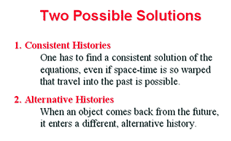
One is what I shall call, the consistent histories approach. It says that one has to find a consistent solution of the equations of physics, even if space-time is so warped, that it is possible to travel into the past. On this view, you couldn't set out on the rocket ship to travel into the past, unless you had already come back, and failed to blow up the launch pad. It is a consistent picture, but it would imply that we were completely determined: we couldn't change our minds. So much for free will. The other possibility is what I call, the alternative histories approach. It has been championed by the physicist David Deutsch, and it seems to have been what Stephen Spielberg had in mind when he filmed, Back to the Future.
In this view, in one alternative history,
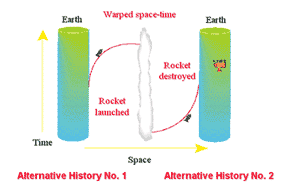 there
would not have been any return from the future, before the rocket set
off, and so no possibility of it being blown up. But when the traveler
returns from the future, he enters another alternative history. In
this, the human race makes a tremendous effort to build a space ship,
but just before it is due to be launched, a similar space ship appears
from the other side of the galaxy, and destroys it.
there
would not have been any return from the future, before the rocket set
off, and so no possibility of it being blown up. But when the traveler
returns from the future, he enters another alternative history. In
this, the human race makes a tremendous effort to build a space ship,
but just before it is due to be launched, a similar space ship appears
from the other side of the galaxy, and destroys it.David Deutsch claims support for the alternative histories approach, from the sum over histories concept, introduced by the physicist, Richard Feinman, who died a few years ago. The idea is that according to Quantum Theory, the universe doesn't have just a unique single history.
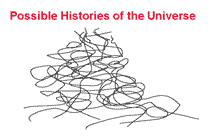 Instead,
the universe has every single possible history,each with its own
probability. There must be a possible history in which there is a
lasting peace in the Middle East, though maybe the probability is low.
Instead,
the universe has every single possible history,each with its own
probability. There must be a possible history in which there is a
lasting peace in the Middle East, though maybe the probability is low.In some histories space-time will be so warped, that objects like rockets will be able to travel into their pasts. But each history is complete and self contained, describing not only the curved space-time, but also the objects in it. So a rocket can not transfer to another alternative history, when it comes round again. It is still in the same history, which has to be self consistent. Thus, despite what Deutsch claims, I think the sum over histories idea, supports the consistent histories hypothesis, rather than the alternative histories idea.
It thus seems that we are stuck with the consistent histories picture. However, this need not involve problems with determinism or free will, if the probabilities are very small, for histories in which space-time is so warped, that time travel is possible over a macroscopic region. This is what I call, the Chronology Protection Conjecture: the laws of physics conspire to prevent time travel, on a macroscopic scale.
It seems that what happens, is that when space-time gets warped almost enough to allow travel into the past, virtual particles can almost become real particles, following closed trajectories. The density of the virtual particles, and their energy, become very large. This means that the probability of these histories is very low. Thus it seems there may be a Chronology Protection Agency at work, making the world safe for historians. But this subject of space and time warps is still in its infancy. According to string theory, which is our best hope of uniting General Relativity and Quantum Theory, into a Theory of Everything, space-time ought to have ten dimensions, not just the four that we experience. The idea is that six of these ten dimensions are curled up into a space so small, that we don't notice them. On the other hand, the remaining four directions are fairly flat, and are what we call space-time. If this picture is correct, it might be possible to arrange that the four flat directions got mixed up with the six highly curved or warped directions. What this would give rise to, we don't yet know. But it opens exciting possibilities.
The conclusion of this lecture is that rapid space-travel, or travel back in time, can't be ruled out, according to our present understanding. They would cause great logical problems, so let's hope there's a Chronology Protection Law, to prevent people going back, and killing our parents. But science fiction fans need not lose heart. There's hope in string theory.
Since we haven't cracked time travel yet, I have run out of time. Thank you for listening.